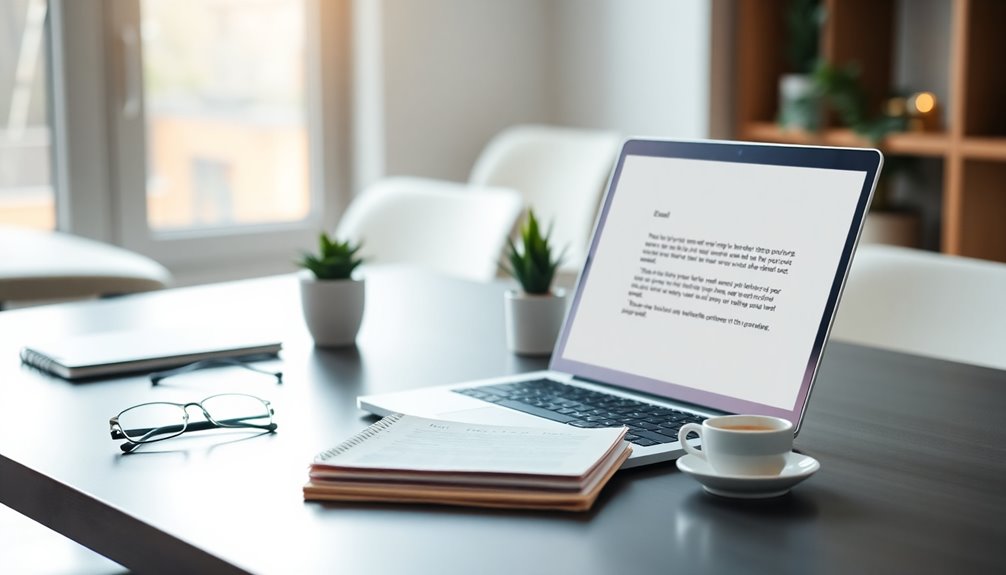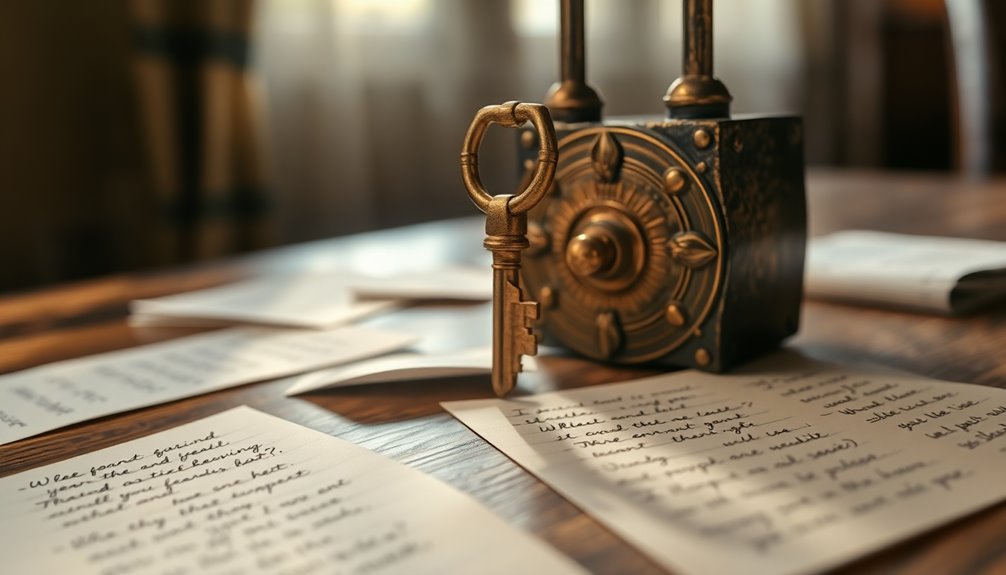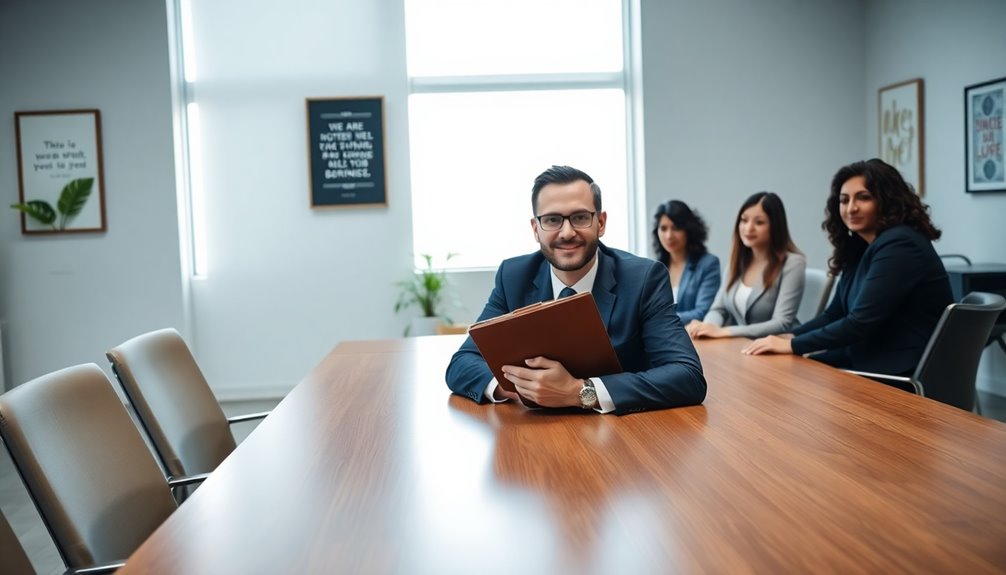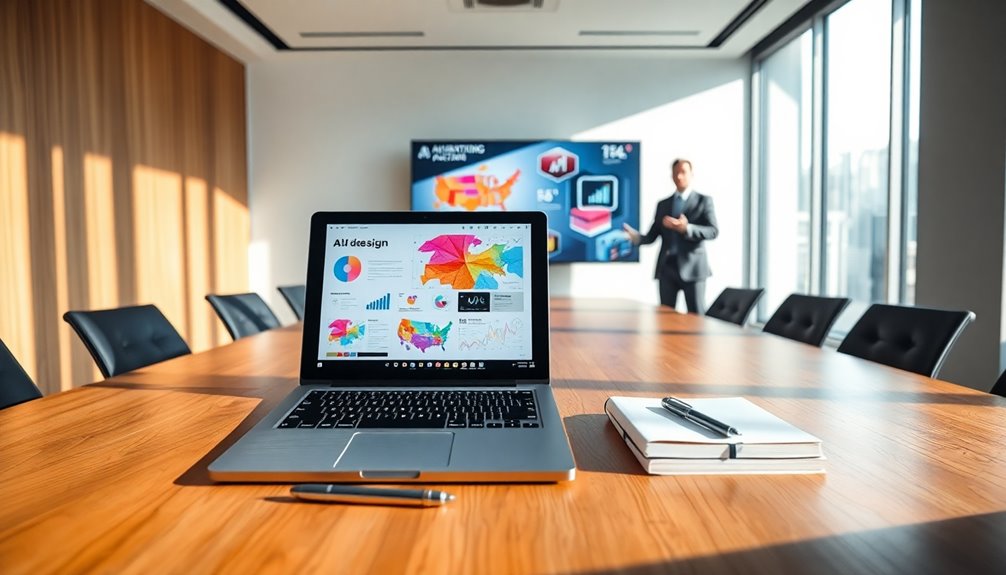A follow-up email after a job interview can really set you apart and show your enthusiasm. Aim to send it within 24-48 hours to make the best impression. Start with a clear subject line, greet the interviewer personally, and express gratitude for the opportunity. Reference specific topics you discussed to personalize your message and reinforce your fit for the role. Keep it concise to maintain engagement, avoid common mistakes like delays or typos, and consider using templates for efficiency. Want to discover eight effective templates that can get you responses? Keep exploring for more insights!
Key Takeaways
- Use clear subject lines that indicate the purpose of your follow-up email to capture attention.
- Reference specific topics discussed in the interview to personalize your message and enhance engagement.
- Express genuine gratitude for the opportunity, reinforcing a positive impression of your candidacy.
- Inquire about the next steps in the hiring process to show continued interest and proactivity.
- Keep your email concise and free from grammatical errors to maintain professionalism and clarity.
Importance of Follow-Up Emails
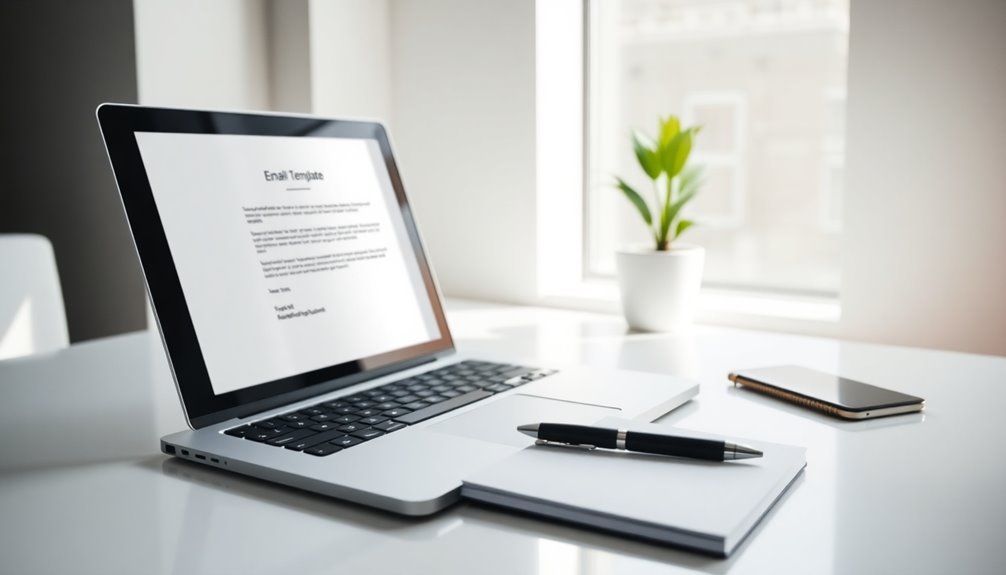
In today's competitive job market, sending a follow-up email after your interview isn't just a nice gesture—it's crucial. A well-crafted follow-up email reinforces professionalism and can set you apart from other candidates who might neglect this critical step. When you send your email within 24-48 hours, you demonstrate enthusiasm and keep yourself top-of-mind for recruiters, increasing your chances of being considered.
This email isn't just about saying "thank you." It allows you to clarify points discussed during the interview, address any concerns, and guarantee that nothing important was overlooked. Timely follow-ups create a lasting impression, showcasing your appreciation for the interviewer's time and effort. This simple act can enhance your professional image considerably.
Moreover, employers often see candidates who follow up as more proactive and committed to the role. Your follow-up email could positively influence the hiring decision, making you appear more engaged and dedicated. So, don't underestimate the power of this small but impactful gesture; it could be the deciding factor in a competitive job market.
Timing for Follow-Up Emails
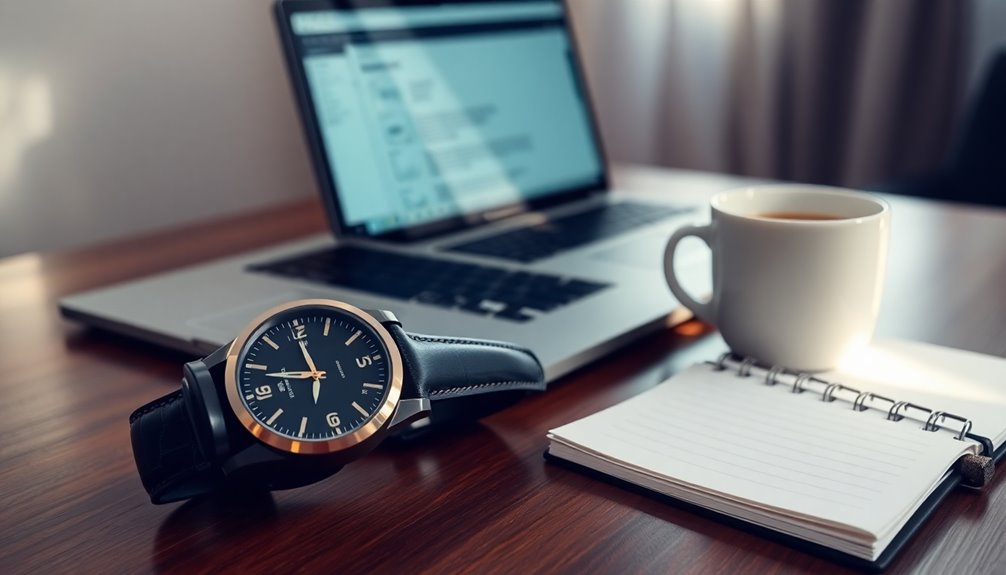
Sending your follow-up email promptly after an interview is essential for making a lasting impression. The ideal timing for this email is within 24-48 hours post-interview. This timeframe maximizes impact and aligns with the recency effect in memory retention, ensuring that hiring managers remember your conversation vividly.
Be mindful, though: sending your follow-up too soon might come off as pushy, while waiting too long could diminish the email's effectiveness and lead to you being forgotten. Most hiring managers expect a follow-up within a couple of days, so adhering to this timeline showcases your professionalism and respect for their decision-making process.
It's also vital to take into account the company culture. In more formal environments, promptness is valued, while casual settings might allow for a slightly longer wait. If you wait too long—like a week or more without communication—it may signal disinterest, which is the last impression you want to leave. Striking the right balance in timing is key to expressing your interest and increasing your chances of receiving positive responses.
Structure of Follow-Up Emails
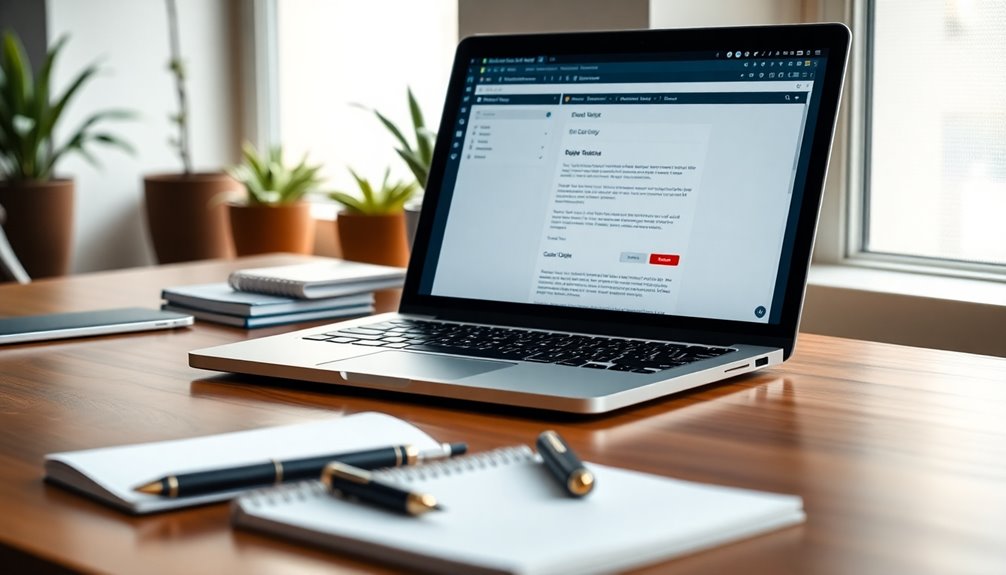
A well-structured follow-up email can make all the difference in reinforcing your candidacy after an interview. Start with a clear subject line that indicates its purpose, like "Thank You for the Interview" or "Follow-Up on [Job Title] Interview." This sets the right tone from the get-go.
Use a professional greeting to address the interviewer by name, which adds a personal touch. Next, express your gratitude for the interview opportunity. Acknowledge the time they spent with you and reiterate your interest in the position and the company. This indicates that you're not just another applicant but genuinely engaged.
Include specific references to topics discussed during the interview to enhance personalization. This reveals that you were attentive and are truly interested in the role. Then, conclude your email with a polite inquiry about the next steps in the hiring process. This keeps the conversation going and shows your enthusiasm.
Finally, provide your contact information for easy follow-up. This small detail guarantees they can reach you effortlessly if needed. By following this structure, you enhance your chances of getting a response and solidifying your candidacy.
Crafting Effective Subject Lines

When crafting your subject line, focus on clear keywords that immediately convey your email's purpose. Make sure it accurately reflects your message to maintain professionalism and avoid confusion. Keep it simple and straightforward—complex phrasing can dilute your intent and may lead to your email being overlooked.
Choosing Clear Keywords
How can you guarantee your follow-up email stands out in a crowded inbox? Start with a clear subject line. This small detail is essential for immediate recognition and sets the tone for your professional email. Consider simple phrases like "Follow-up on Job Interview" or "Thank You for Your Time." These straightforward options reflect your gratitude for the interviewer's time and show your continued interest in the company.
Using "Re:" in the subject line of your reply can also create continuity and context, making it easier for the recipient to recall your previous interaction. It's important your subject line accurately reflects the content of your email to avoid confusion; vague or overly complex titles can easily lead your follow-up email to be overlooked.
To maximize your chances of receiving responses, stick to concise and relevant keywords. Remember, during the interview process, a clear subject line not only helps your email stand out but also demonstrates your professionalism. By using effective email templates and maintaining clarity, you'll enhance your follow-up strategy and boost your chances of making a lasting impression.
Reflecting Email Content
Crafting effective subject lines is vital for guaranteeing your follow-up email gets noticed. A clear and concise subject line sets the tone and captures the hiring manager's attention immediately. Simple phrases like "Thank You for the Opportunity" or "Follow-Up on Our Interview" work well, making it easy for them to identify the email's purpose.
When possible, personalize your subject line to reflect specific topics discussed during the interview. This approach increases engagement and makes your email more memorable. For example, you might say, "Thanks for Discussing the Marketing Strategy" or "Follow-Up on Our Product Launch Conversation." Such personalized touches can resonate with the hiring manager and prompt quicker responses.
Using "Re:" when responding to existing email threads can also provide context and continuity, helping the interviewer recall your previous conversation. Remember, clarity is vital; avoid vague or overly complex subject lines. The goal is to guarantee your email is opened and read promptly. By focusing on these elements, you'll craft a professional follow-up email that effectively conveys your appreciation and enthusiasm for the opportunity.
Avoiding Complex Phrasing
A follow-up email's subject line should be straightforward and easy to understand, ensuring the hiring manager knows what to expect at a glance. Opt for clear and concise phrases, like "Thank You for the Interview," to immediately convey your message. This approach captures attention and signals your professionalism.
Incorporating the job title into your subject line, such as "Follow-Up on [Job Title] Interview," adds specificity and helps the interviewer quickly recall your conversation. Avoid vague language; specificity increases the chances of your email being opened and read.
Remember, your subject line sets the tone for the entire follow-up email. It should reinforce your interest in the position while showcasing your specific experience discussed in the interview. By maintaining clarity, you demonstrate your commitment to the application process.
Using simple phrases like "Follow-Up" effectively communicates your intention without overwhelming the reader. This focus on simplicity not only aids comprehension but also enhances the overall professionalism of your correspondence. In emails after an interview, a well-crafted subject line can make a significant difference in how your message is received.
Personalization Strategies
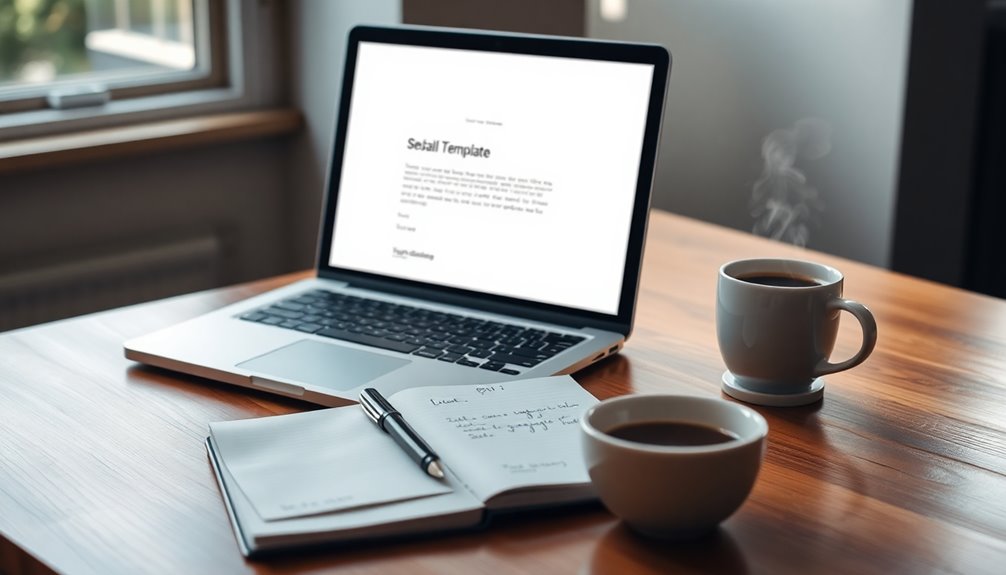
When you personalize your follow-up email, start by referencing specific topics you discussed during the interview. This shows you were engaged and helps create a connection with the interviewer. Also, make sure to tailor your message to reflect the company's culture, demonstrating that you're a great fit for their mission.
Reference Interview Topics
Personalization in follow-up emails can make a lasting impression on interviewers. By personalizing follow-up emails to reference specific topics discussed during the interview, you increase both engagement and memorability. Reflect on the conversation and mention any shared interests or connections you noted. This not only reinforces a positive impression but also helps establish rapport with your interviewer.
Tailoring messages to highlight your relevant skills and qualifications from the interview shows that you're genuinely interested in the role and the company. In a competitive job market, candidates who take the time to craft meaningful messages stand out. When you remind the interviewer of your strengths while aligning them with the company culture, you demonstrate that you're not just another applicant.
Consider mentioning any specific challenges discussed, offering insights on how your skills can address them. By weaving in these elements, you create a compelling narrative that reinforces your suitability for the role. Ultimately, personalizing your follow-up email not only showcases your qualifications but also your commitment to becoming part of their team, leaving a memorable impression. Additionally, being aware of emotional manipulation can help you navigate professional relationships effectively.
Tailor to Company Culture
Tailoring your follow-up email to reflect the company's culture can greatly enhance engagement and demonstrate your fit within the organization. When you incorporate elements that resonate with the specific values discussed during your interview, you create a personalized connection that reinforces your genuine interest in the role.
To effectively tailor your email, consider the following strategies:
| Company Culture Aspect | Tailoring Approach | Example |
|---|---|---|
| Specific Values | Reference core values from the interview | "I admire your commitment to sustainability." |
| Communication Style | Match the tone (formal/casual) | "I enjoyed our relaxed discussion." |
| Shared Interests | Mention common hobbies or interests | "I loved hearing about your team's hiking trips." |
| Engagement | Ask questions that reflect company initiatives | "How's the new project on diversity coming along?" |
| Rapport | Reflect on a personal connection made | "I appreciated your insights on team collaboration." |
Common Mistakes to Avoid
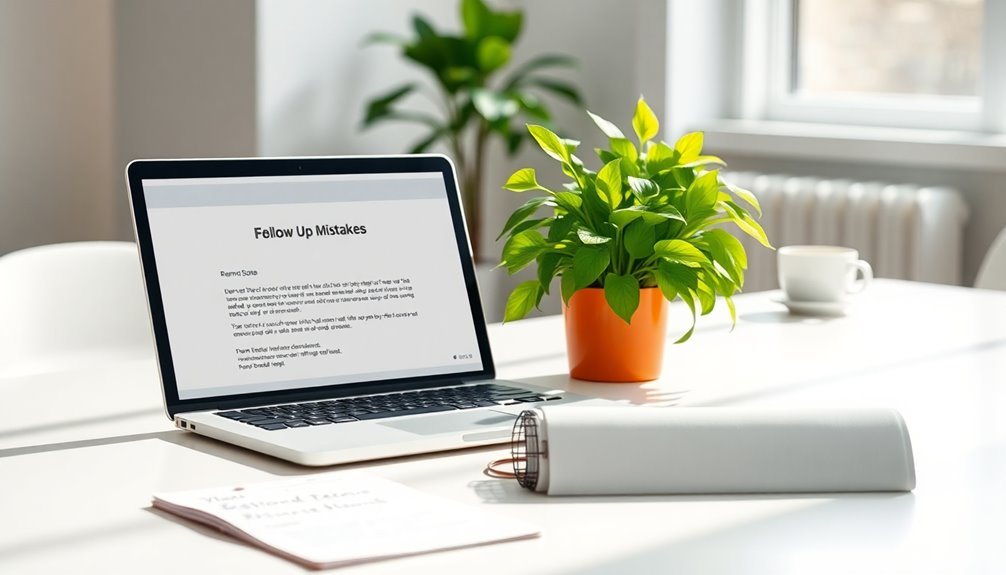
Following up after a job interview is vital, but it's easy to slip up and make common mistakes that can hurt your chances. You want to guarantee your follow-up email leaves a positive impression and communicates your gratitude and interest effectively. Here are three mistakes to avoid:
- Delayed Response: Sending your follow-up email too late can diminish its impact. Aim to send it within 24-48 hours to keep your name fresh in the interviewers' minds.
- Excessive Information: Overloading your email with details about every specific project can overwhelm the reader. Stick to a key message that expresses your appreciation and reiterates your interest in the position.
- Grammatical Mistakes: Failing to proofread can undermine your professionalism. Spelling errors or informal language can create a negative impression, especially if they conflict with the company's culture.
Personalization is vital, so make your email tailored to the interviewer and their insights shared during your meeting. Avoid generic or overly formal tones to maintain engagement and connection.
Enhancing Emails With AI Tools
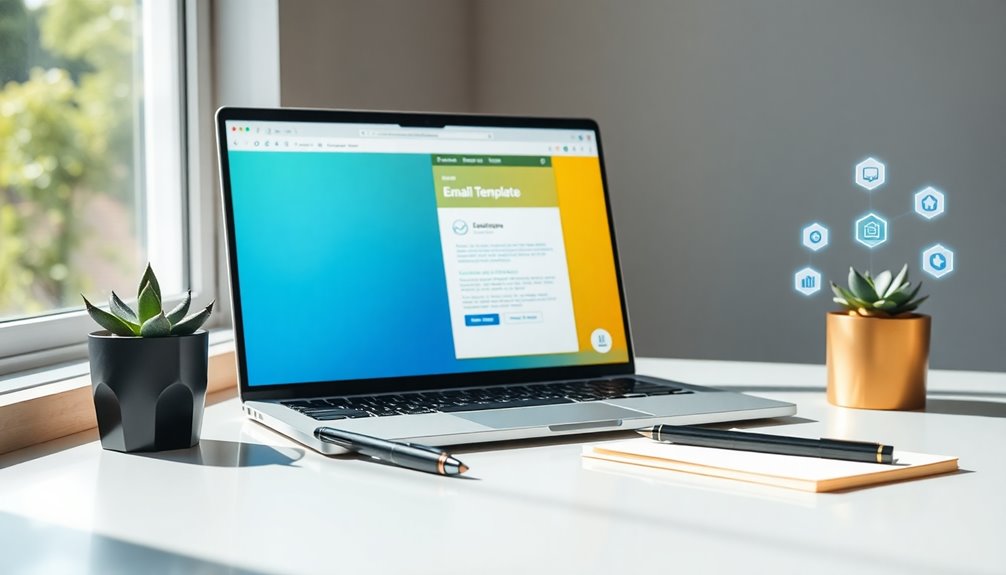
With the rise of AI tools, enhancing your follow-up emails has never been easier. These innovative technologies, like MailMaestro, can markedly expedite the drafting process, allowing you to create polished messages in a fraction of the time. By analyzing the context of your interview conversation, AI tools suggest personalized content that makes your emails more relevant and engaging.
Utilizing AI also guarantees your follow-up emails are free from errors, thanks to built-in grammar and spell-check features. This helps you maintain a professional tone, which is vital in making a positive impression. Additionally, AI tools streamline the writing process by offering templates and structured options, so you don't have to start from scratch.
Moreover, with support for multiple languages, these tools facilitate clear communication across diverse work environments, making your follow-up emails more accessible, especially for non-native speakers. By leveraging AI tools, you not only enhance the quality of your emails but also save time and effort, allowing you to focus on other important aspects of your job search. Embrace these technologies to boost your chances of making a lasting impression.
Follow-Up Email Templates
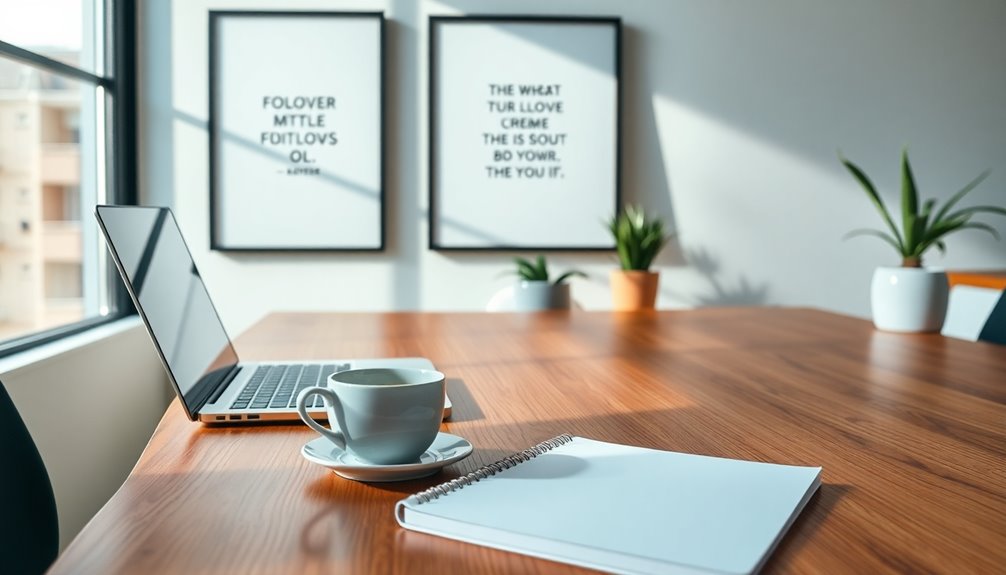
Often, candidates find that using follow-up email templates can streamline their communication after an interview. These templates not only save time but also guarantee your messages are structured and effective. A well-crafted follow-up email helps express your gratitude while reinforcing your interest in the position.
Here are three essential elements to include in your templates:
- Personalization: Reference specific topics from the interview to make your email memorable. This shows you're engaged and attentive.
- Timeliness: Send your follow-up email within 24 to 48 hours after the interview. Hiring managers appreciate timely communication, which can enhance your professional image.
- Clear Subject Line: Use a straightforward subject line like "Thank You for the Interview" to help your email stand out in a busy inbox.
Frequently Asked Questions
How Do I Write an Email to Follow up on a Job Interview?
To write a follow-up email after your job interview, start within 24-48 hours. Use a clear subject line like "Thank You for the Opportunity." In the body, thank the interviewer for their time, reference specific topics you discussed, and express your enthusiasm for the role. Don't forget to ask about the next steps in the hiring process. Finally, proofread your email to guarantee it's professional and error-free.
How Do You Follow up an Email After an Interview No Response Template?
When you're following up after an interview with no response, keep it concise, keep it polite, and keep it professional. Begin by expressing your continued enthusiasm for the role, mention a specific topic from your discussion that resonated with you, and inquire about the hiring timeline. Send it about a week after your last contact to show you're patient yet keen. Close with a friendly note and your contact information for easy replies.
How Do You Ask for Feedback After an Interview Template?
To ask for feedback after your interview, start by sending a polite email within a week. Express your gratitude for the opportunity and mention specific points from the interview that resonated with you. Clearly state that you're seeking constructive feedback to improve your skills. Keep it concise and respectful, and end with a thank-you note to show appreciation for their time. This approach keeps you professional and engaged in the hiring process.
How to Send a Follow-Up Email if There Is No Response?
Sending a follow-up email is like casting a line into a still pond; patience is key. If you haven't heard back in a week or two, it's perfectly fine to reach out. Keep it brief and professional, expressing your interest in the position. A subject line like "Checking in on [Job Title] Application" grabs attention. Remember, one well-timed follow-up shows your enthusiasm without coming off as pushy.
Conclusion
To sum up, sending a follow-up email after a job interview can greatly boost your chances of landing the position. Studies show that candidates who follow up are 20% more likely to receive a positive response. By timing your email correctly and personalizing your message, you can leave a lasting impression on your potential employer. So, don't hesitate—make that follow-up email count and stand out from the competition!
